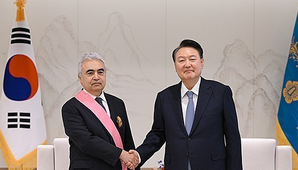China, Russia strike deal with Houthis for ship safety in Red Sea

Following talks between Houthi top leader Mohammed Abdel Salam and diplomats of China and Russia in Oman, Yemen-based militant group has assured Beijing and Russia that their ships sailing through the Red Sea and Gulf of Aden will not be attacked.
According to a Bloomberg report, citing people with knowledge of the militant group’s discussions, the two countries in exchange may provide political support to the Houthis in bodies such as the United Nations Security Council.
It’s not entirely clear how that support would be manifested, but it could include blocking more resolutions against the group, added the report.
The recent discussions indicate growing concerns among major powers, notably Moscow and Beijing, over the Houthi group’s missile and drone attacks in the southern Red Sea region since mid-November. While the Houthis have assured that assets belonging to Russia and China would not be targeted, there is a sense of unease among global actors.
Despite claiming to target ships associated with Israel, the US, and the UK, the Houthis have reportedly misidentified some vessels. This has led Russia and China to seek stronger guarantees from the group.
In recent days, the Houthis attacked the True Confidence, a bulk-commodities carrier, resulting in casualties. Although they claimed it to be an American vessel, it was previously owned by Oaktree Capital based in Los Angeles and has since been acquired by a non-US entity.
Additionally, missiles struck near a ship transporting Russian oil near Yemen in late January. This incident occurred shortly after a Houthi spokesperson assured Russian and Chinese merchant ships of safety.
While ostensibly aimed at pressuring Israel to cease its Gaza conflict with Hamas, analysts remain skeptical that the Houthis would halt their campaign even with a ceasefire or peace deal in place.
The waterways – including the Bab el-Mandeb strait connecting the Red Sea and Gulf of Aden – are crucial for the global economy and normally around 30 per cent of container cargo flows through them. They also handle a large proportion of oil and liquefied natural gas flows.
Since the attacks started, most Western shipping firms have avoided the strait and are instead going around southern Africa. That’s adding days and significant freight costs onto journeys between Asia and Europe.
Companies from China and Russia have not announced they are avoiding the area and ship-tracking data shows many of them still send their ships through it.
Both China and Russia are diplomatic and economic partners of the Houthis’ main military and financial backer, Iran. Most Iranian oil exports go to China and the Islamic Republic has, according to the US and European Union, provided drones and other weaponry to Russia for its war in Ukraine.
Still, the Houthis retain plenty of independence from Tehran. Iran has said it supports the Houthis but that they make their own decisions on political and military matters.





